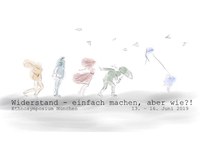Zusammenfassung
- Was Call For Papers — Call for Contributions zum 15. Ethnosymposium, 13. - 16. Juni 2019 in München
- Wann to (Europe/Berlin / UTC100)
- URL https://www.facebook.com/Ethnosymposium-M%C3%BCnchen-2019-2208182555872368/
- Termin herunterladen iCal Datei herunterladen
Beschreibung
Mit grenzenloser Vorfreude möchten wir Euch zum 15. Ethnosymposium im kommenden Sommer nach München einladen! Das dreitägige Event wird bereits seit 2004 mit jährlich wechselndem Veranstaltungsort im deutschsprachigen Raum von Studierenden für Studierende ausgetragen. Gemeinsam mit Euch und euren Beiträgen wollen wir einen kreativen Austausch in lockerer Atmosphäre verwirklichen. Willkommen sind Studierende der Ethnologie, KSA und alle weiteren Interessierten. Nachdem wir das letzte Mal in Hamburg Utopien erdacht haben, widmen wir uns nun folgendem Thema:
WIDERSTAND – einfach machen, aber wie?!
Dabei könnten beispielsweise folgende Fragen behandelt werden, die sich lohnen genauer diskutiert zu werden: Was ist, wer leistet und wie funktioniert bzw. gelingt Widerstand? Wie können erdachte Uto-pien damit verwirklicht werden? Wann und wo finden sich Mobilisierungspotentiale? Wann beginnt Widerstand, wo hört er auf – wann sollte er beginnen/aufhören? Welche Rolle spielen dabei Revolution und Reform, Ethik und Gesetze? Widerstand alltäglich oder ritualisiert – passiv oder aktiv – global, lokal oder glokal? Wieso bzw. wogegen müssen wir widerstehen und welchen Widerständen sind wir selbst ausgesetzt? Was kann die Ethnologie zu all dem beitragen? Welche Fragen stellen sich Euch bei diesem Thema?
Angeregt hat unser Interesse unter anderem die diesjährige Änderung des Polizeiaufgabengesetzes (kurz PAG) und alle gesellschaftlichen Reaktionen darauf. Selten zuvor hatten junge Münchner*innen so sehr das Gefühl, gemeinsam für eine Sache einzustehen, wie bei den Gegendemonstrationen „noPAG“, bei denen je nach Zählung bis zu 40.000 Menschen auf die Straße gingen. Die dort entfesselte Euphorie machte allen Anwesenden Hoffnung, etwas an der Situation ändern zu können. Als das Gesetz dennoch kam, stellten viele niedergeschlagen fest, dass ihre Bemühungen in Ohnmacht verpufften. München ist ebenso historischer Ort des Widerstands. Erwähnt seien an dieser Stelle nicht zuletzt das hundertjährige Jubiläum der Novemberrevolution und Münchner Räterepublik, sowie die NS-Wider-standsbewegung „Weiße Rose“, deren Kern aus Mitgliedern der Ludwig-Maximilians-Universität Mün-chen bestand. Doch auch historisch negative Bewegungen, wie der (schlussendlich gescheiterte) Hitler-putsch aus dem Jahre 1923, fanden hier statt.
Was motiviert Euch am Thema Widerstand? Das Symposium lebt von Eurem Engagement. Daher sind wir gespannt auf Beiträge jeglicher Art in deutscher und englischer Sprache! Wir freuen uns über Vorträge, Diskussionen, Workshops, Film-/Foto-/Toninstallationen und jegliche kreative Gestaltungsideen.
Format Eurer Abstracts
Damit wir ein ansprechendes Programm zusammenstellen können, bitten wir um die Einsendung Eurer Abstracts (max. 2000 Zeichen). Denkt dabei bitte an:
• Name & Kontaktdaten (Mailadresse und Telefonnummer)
• Titel eures Vorhabens
• Benötigter Zeitrahmen
• Bevorzugtes Datum und Zeitraum innerhalb des Wochenendes
• Benötigte Technik und sonstige Materialien
Wann und Wohin?
An: ethnosymposium2019@ethnologie.lmu.de, Betreff: CONTRIBUTION: Titel des Beitrags
Einsendeschluss ist der 18. März 2019.
Servus und bis bald
Euer Team Ethnosymposium München
Call for contributions for the 15th Ethnosymposium 13th – 16th of June 2019 in Munich
With boundless anticipation we would like to invite you to the 15th Ethno-Symposium in Munich next summer! This three-day event has been organized by students for students since 2004, with annually changing venues in German-speaking countries. Together with you and your contributions we want to realize a creative exchange platform in a relaxed atmosphere. All students of social and cultural anthro-pology and all others who are interested are welcome. After we have imagined utopias in Hamburg last year, we now dedicate ourselves to the following topic:
RESISTANCE – just doing, but how?!
We would like to discuss some of the following questions: What is resistance? Who resists what and how does that work? How can imagined utopias be realized? When and where is mobilization potential to be found? When does resistance begin, where does it stop - when should it stop? What role does revolution and reform, ethics and the law play? Is resistance an everyday or a ritualized practice – is it passive or active - global, local or glocal? Why and against what do we have to resist and what re-sistances are we exposed to ourselves? What can anthropology contribute to all this? What questions do you have on this topic?
One of the reasons for our interest in this topic was this year's drastic expansion of police power in the new Bavarian law on police duty Polizeiaufgabengesetz (PAG) and the following reactions in civil soci-ety. Rarely before young people in Munich had had such a powerful experience of standing up for a common concern, as it was the case with the noPAG manifestations, which counted up to 40.000 people in the streets. The unleashed euphoria made everyone hopeful for a change, however, when the law passed anyways, many realized, that their effort had been in vain and were confronted with their pow-erlessness. Munich is also historically a place of resistance. Here we must name the November revolu-tion which just celebrated its hundredths anniversary, the council republic of Munich and the resistance group during the Nazi Regime Weiße Rose, whose nucleus was formed by students of the Ludwig-Max-imilians-University of Munich. At the same time Munich has known many negative movements of re-sistance, such as the failed Hitler-coup in 1923.
What is it that motivates you about the topic of resistance? It is your commitment that will bring this symposium to life and that’s why we are eagerly awaiting contributions of any kind in German or English! We look forward to talks, discussions, workshops, media installations, and any other creative ideas.
Format for your abstract
We would like to ask you to send us an abstract for your contribution (max. 2000 characters), so that we can create an attractive programme. Please consider the following information:
• Name & contact details (E-mail address and mobile number)
• Title of your project
• Time needed
• Preferred date and time within the weekend.
• Technical equipment and material needed
When and where to submit?
To: ethnosymposium2019@ethnologie.lmu.de, Subject: CONTRIBUTION: Title of your contribution
The deadline is 18 March 2019.
Servus and see you soon,
Your Team for the Ethnosymposium München

